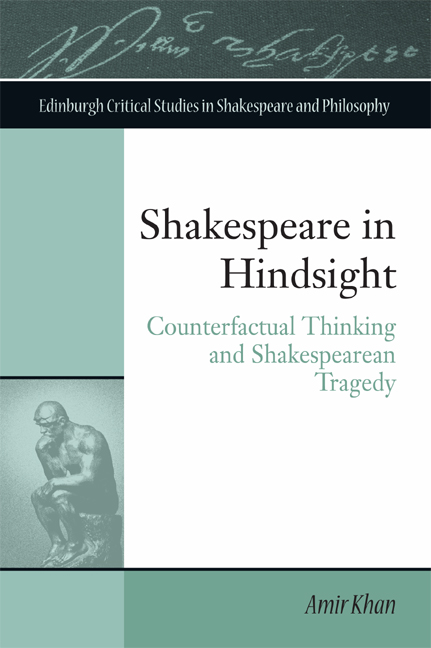Book contents
- Frontmatter
- Contents
- Acknowledgements
- A Note on Texts
- Series Editor's Preface
- Dedication
- 1 Introduction
- 2 My Kingdom for a Ghost: Counterfactual Thinking and Hamlet
- 3 Reversing Good and Evil: Counterfactual Thinking and King Lear
- 4 Staging Passivity: Counterfactual Thinking and Macbeth
- 5 Reversing Time: Counterfactual Thinking and The Winter's Tale
- 6 ‘Why Indeed Did I Marry?’: Counterfactual Thinking and Othello
- 7 Conclusion
- Notes
- Further Reading
- Index
- Frontmatter
- Contents
- Acknowledgements
- A Note on Texts
- Series Editor's Preface
- Dedication
- 1 Introduction
- 2 My Kingdom for a Ghost: Counterfactual Thinking and Hamlet
- 3 Reversing Good and Evil: Counterfactual Thinking and King Lear
- 4 Staging Passivity: Counterfactual Thinking and Macbeth
- 5 Reversing Time: Counterfactual Thinking and The Winter's Tale
- 6 ‘Why Indeed Did I Marry?’: Counterfactual Thinking and Othello
- 7 Conclusion
- Notes
- Further Reading
- Index
Summary
I am making the case that Shakespeare criticism is caught in a dialectical trap. In the aggregate, Shakespeare verifies either our freedom or our unfreedom. In the current critical climate, counterfactual thinking could only be read as a type of character criticism, or renewal of Bradleyan character criticism. However, Bradley's ‘flaws’ are not discovered; they are applied to the text in advance, quashing character freedom. Counterfactual criticism attempts to recover this freedom by emphasising the play of outer contingency over inner necessity. Yet moving forward, no critical law dictates that considering counterfactuals demands the discussion of character over events, as character is no doubt shaped by events anyway. In the matrix of contingencies available in the present, it may now be worth emphasising character choice. But the discussion of possible events could just as easily lead the conversation of counterfactual thinking. Where character meets event is a contested site, not in presupposing other factors to clash there, but in acknowledging that each exists in juxtaposition to the other. Neither side can be verified as true once and for all. Put simply, a charactere's freedom is not a stable entity or personality trait that said character simply accepts or denies, as though it is our critical lot to establish whether or not he does that. Rather, it is to reiterate that just because a character chooses does not constitute a fate, which is a negation of choice. A character, of course, must choose. Macbeth makes his choice, which is, in his peculiar case, an attempt to negate choice and action, which could have been achieved more readily (but less dramatically) had he chosen to do nothing. But after Macbeth chooses, critics who comment on Macbeth or anyone else after the fact will be tempted to seek out a dangerous sort of knowledge – one that must come up with ways, whether aesthetic, psychological or material, to explain why said character chose one way and not another, wanting to believe that by choosing alone, said character has relinquished his freedom. But freedom exists only when possibilities are open. Just because one choice is made over another does not mean that one had to choose that one, out of necessity, over the others. Yet this is the rabbit any propositional criticism will chase out eternally.
- Type
- Chapter
- Information
- Shakespeare in HindsightCounterfactual Thinking and Shakespearean Tragedy, pp. 139 - 144Publisher: Edinburgh University PressPrint publication year: 2015



